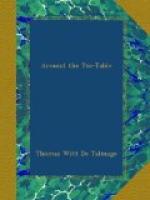Do not worry because the time comes on when you must go into the next world. It is only a better room, with finer pictures, brighter society and sweeter music. Robert McCheyne, and John Knox, and Harriet Newell, and Mrs. Hemans, and John Milton, and Martin Luther will be good enough company for the most of us. The cornshocks standing in the fields to-day will not sigh dismally when the buskers leap over the fence, and throwing their arms around the stack, swing it to the ground. It is only to take the golden ear from the husk. Death to the aged Christian is only husking-time, and then the load goes in from the frosts to the garner.
My congratulations to those who are nearly done with the nuisances of this world. Give your staff to your little grandson to ride horse on. You are going to be young again, and you will have no need of crutches. May the clouds around the setting sun be golden, and such as to lead the “weather-wise” to prophesy a dear morning!
Quizzle.—But, Governor Wiseman, does it not give you a little uneasiness in this day of so much talk about cremation as to what will become of your body after you leave this sphere?
At this point Doctor Heavyasbricks wiped his spectacles, as though he could not see well, and interrupted the conversation by saying, “Cremation! Cremation! What’s that?” Sitting at the head of the table, I explained that it was the reduction of the deceased human body through fire into ashes to be preserved in an urn. “Ah! ah!” said Doctor Heavyasbricks, “I had the idea, from the sound of that word ‘cremation,’ it must be something connected with cream. I will take a little more of that delicious bovine liquid in my tea, if you please,” said the doctor as he passed his cup toward the urn, adding, to the lady of the house, “I hope that urn you have your hand on has nothing to do with cremation.” This explanation having been made, Governor Wiseman proceeded to answer the question of Quizzle:
No; I have no uneasiness about my body after I have left it. The idea you speak of will never be carried out. I know that the papers are ardently discussing whether or not it will be best to burn the bodies of the dead, instead of burying them. Scientific journals contend that our cemeteries are the means of unhealthy exhalations, and that cremation is the only safe way of disposing of the departed. Some have advocated the chemical reduction of the physical system.
I have, as yet, been unable to throw myself into a mood sufficiently scientific to appreciate this proposal. It seems to me partly horrible and partly ludicrous. I think that the dead populations of the world are really the most quiet and unharmful. They make no war upon us, and we need make no war upon them. I am very certain that all the damage we shall ever do this world, will be while we are animate. It is not the dead people that are hard to manage, but the living. Some whistle to keep their courage up while going along by graveyards; I whistle while moving among the wide awake. Before attempting this barbaric disposal of the human form as a sanitary improvement, it would be better to clear the streets and “commons” of our cities of their pestiferous surroundings. Try your cremation on the dogs and cats with extinct animation.




